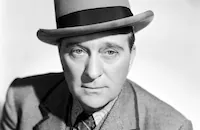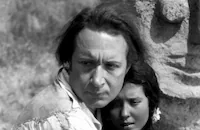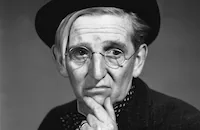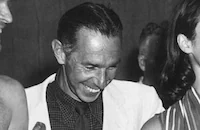New York Town
Cast & Crew
Charles Vidor
Fred Macmurray
Mary Martin
Robert Preston
Akim Tamiroff
Lynne Overman
Film Details
Technical Specs

Synopsis
Victor Ballard, a happy-go-lucky albeit impoverished sidewalk photographer, shares a New York City studio apartment with Polish immigrant painter Stefan Janowski. The big city doles out joy and misery indiscriminately: In the apartment below Victor and Steve, Gus Nelson learns that his wife has given birth to quintuplets, while the lonely tenant in the apartment below Gus has given up on life and committed suicide. One day while hawking his work on Fifth Avenue, Victor snaps a picture of recently impoverished Alexandra Curtis, and intuits that she is desperate and naïve. Victor befriends Alexandra and shares with her his tricks for survival, such as getting meals by eating free food samples in a market, and "crashing" shipboard parties before the ship leaves. Victor brings Alexandra home as a third roommate, and proposes that she become a salesman for his photo "business," which involves taking a photo of a passerby on the street, getting his name and address, then going to the pedestrian's home and selling him either an enlarged photo for five dollars, or an oil painting of the photo by Steve for fifty dollars. In order to get Alexandra's belongings out of hock, Victor and Steve take her to a radio broadcast of a quiz show that gives cash prizes. Alexandra becomes a contestant after the first contestant faints, and she wins sixty-four dollars with a little coaching from Victor. Victor and Steve's friend Sam, meanwhile, a legless veteran who sells pencils on the street, uses his military pension to hire Bender, a lawyer, to get Steve citizenship. Bender's advice, however, is that Steve get a position at a university. Alexandra becomes depressed when she is unable to sell any paintings, and in order to cheer her up, Victor takes her out for a night of fun, during which they crash a private party on a cruise ship before it sails for Rio de Janeiro. Victor decides that Alexandra's best "career" would be marriage, and the next day, he insists that she try to sell a painting to his most wealthy client, Paul Bryson. Alexandra resents Victor's practical suggestion, as she wants to marry for love, but she goes to Bryson's Park Avenue home anyway. Alexandra is delighted when she meets Bryson's handsome son, also named Paul, and learns that Bryson, Sr., is on his honeymoon. Alexandra and Paul hit it off, and to his own surprise, Victor becomes jealous. Victor's pride is then hurt when Paul gets Steve an interview with the dean of a university, and Steve is hired. When Paul casually proposes to Alexandra as they plan a vacation together, she admits that she is a gold digger, but Paul is undisturbed. Victor, meanwhile, gets drunk while celebrating Steve's good fortune, and then goes to Paul's house. After telling him that Alexandra has been living with him, Victor hits Paul. A fistfight ensues, but on the way home, Alexandra and Victor admit their love for each other and kiss.

Director

Charles Vidor
Cast

Fred Macmurray

Mary Martin

Robert Preston

Akim Tamiroff

Lynne Overman

Eric Blore

Fuzzy Knight

Cecil Kellaway
Oliver Prickett
Ken Carpenter
Edward Mcnamara
Sam Mcdaniel

Iris Adrian

Margaret Hayes

Regis Toomey

Laura Hope Crews

Charles Lane

Monte Blue

Jimmy Conlin
Cliff Nazarro

James Flavin
Marshall Ruth
Grace Hayle
Chester Clute
Nell Craig
Linda Gage
Frances Morris
Alice Keating
Marjorie Deane
Jack Rice
Lilyan Irene
George Davis
John Bagni
Maynard Holmes
Paul Fierro
Paul Mcvey

Jack Arnold
Ted Barnick
Kenneth Hunter
Philip Van Zandt
Wallace Rairden
Kate Lawson

Ann Doran
Nicholas Bela
Delmar Watson
Milton Kibbee
Tommy Bond
Gus Reed
Jack Gardner
Ray Flynn
Patricia Knox

Pauline Wagner
John H. Dilson
Jack Carr
Herbert Vigran

Sidney Melton
Lee Prather
Ralph Peters
Keith Richards
Gloria Williams
Ethel Clayton

Wanda Mckay
Jean Phillips
Olivia Steele
Ella Neal

Eva Gabor
Crew
Will D. Cobb
Hans Dreier
John H. Flynn
Gene Garvin
Stanley Goldsmith
Hugo Grenzbach
Doane Harrison
Edith Head
Sigmund Krumgold
William Lebaron
Lewis Meltzer
Holly Morse
William Pereira
Charles Schoenbaum
Leo Shuken
Jule Styne
Jo Swerling
Anthony Veiller

Film Details
Technical Specs

Quotes
Trivia
Notes
Jo Swerling's original screen story was called "Night Time." Mitchell Leisen was originally slated to direct this film, but, according to Hollywood Reporter, was replaced by Charles Vidor after Leisen was assigned to direct I Wanted Wings. Vidor was borrowed from Columbia Pictures. A Los Angeles Times news item announced that Betty Brewer was cast in the film, but her appearance in the final film has not been confirmed. Some background scenes were shot on location in New York City. Ken Carpenter was a radio announcer for the Edgar Bergen and Charlie McCarthy show and the Kraft Music Hall radio show. The quiz show in this film was modeled after Take It or Leave It, also known as The Sixty-Four Dollar Question,a 1940s radio contest in which participants could win up to sixty-four dollars by answering a battery of questions. According to a New York Times article, the film's ending originally contained a scene showing a Bund parade, but was re-shot, as Paramount executives felt that the pro-Nazi German faction of the Bunds would soon disband.












